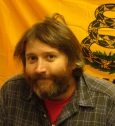 On March 2, 2013, 7:00 p.m. at the Canyon Community Center, Brett Mizelle, Professor of History and Director of the American Studies Program at California State University, Long Beach presents a lecture on his new book, Pig.
On March 2, 2013, 7:00 p.m. at the Canyon Community Center, Brett Mizelle, Professor of History and Director of the American Studies Program at California State University, Long Beach presents a lecture on his new book, Pig.
Pig is the latest publication in a series of books, the Animal series, that calls itself “a new kind of animal history.” The Animal series from Reaktion Books uniquely explores the natural history of an animal alongside its historical and cultural impact on humankind. Now in its 10th year of publication, and with 50 titles available, this acclaimed and groundbreaking series continues to lead the way in natural history publishing. Professor Brett Mizelle is one of several academics who have written books in the Animal series.
Humans and pigs have lived alongside each other since early pigs were domesticated 9,000 years ago, and we are facing a future in which pigs and humans will be even more closely intertwined as a result of biomedical breakthroughs and the rising global pork consumption. In Pig, Brett Mizelle provides a richly illustrated and compelling look at the long, complicated relationship between humans and these highly intelligent, sociable animal, focusing on the contradictions between our idealized view of pigs and the truth of the ways in which pigs have been selectively bred to fulfill human desire for their meat and to make hundreds of consumer products. Pig explores human kinship with pigs in the worlds of art, literature and entertainment, but it also investigates the history of the development of modern industrial pork production. Pig shows how humans have shaped the pig; and how the pig has shaped us in its turn.
Join us on Saturday, March 2, 2013 at 7:00 p.m. at the Canyon Community Center for this interesting and inventive look at pigs.
 |
This event has received funding from the Utah Humanities Council. The Utah Humanities Council promotes history and heritage, literature and literacy, and public discussion of issues important to our communities. Any views, findings, conclusions, or recommendations expressed in this website or the lectures do not necessarily represent those of the Utah Humanities Council or the National Endowment for the Humanities. |
 On March 2, 2013, 7:00 p.m. at the Canyon Community Center, Brett Mizelle, Professor of History and Director of the American Studies Program at California State University, Long Beach presents a lecture on his new book, Pig.
On March 2, 2013, 7:00 p.m. at the Canyon Community Center, Brett Mizelle, Professor of History and Director of the American Studies Program at California State University, Long Beach presents a lecture on his new book, Pig. 

